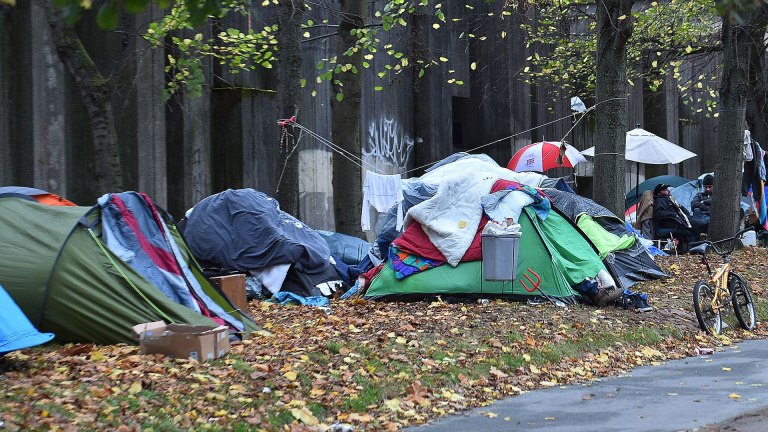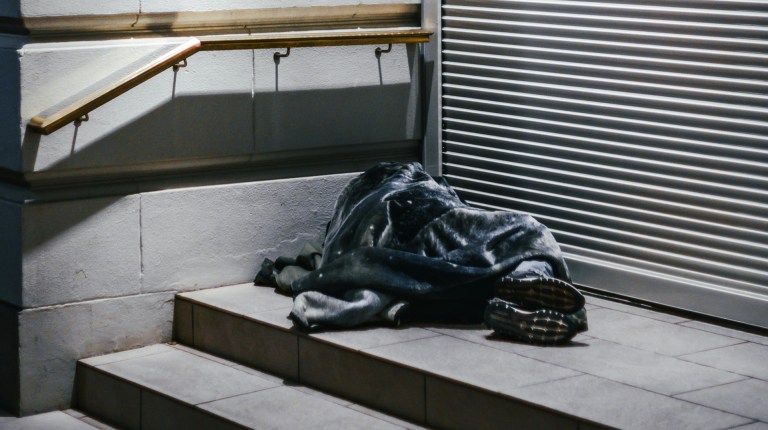Housing First is a model that gives rough sleepers a home alongside the support they need to keep it, often for an unlimited time.
The model was first developed in New York in the 90s and has since built a big reputation for tackling street homelessness, most notably in Finland.
White House spokesperson Karoline Leavitt said the executive orders will instead target “vagrant criminals” on the street.
She said: “By removing vagrant criminals from our streets and redirecting resources toward substance abuse programs, the Trump administration will ensure that Americans feel safe in their own communities and that individuals suffering from addiction or mental health struggles are able to get the help they need.”
The White House said the executive orders came off the back of record-high numbers of people counted as living on the streets. It said 274,224 people were recorded in last year’s count during the Joe Biden administration.
It added: ”The overwhelming majority of these individuals are addicted to drugs, have a mental health condition, or both.”
Advertising helps fund Big Issue’s mission to end poverty
But homelessness campaigners have criticised Donald Trump’s move, warning that he is peddling “racist myths” and making efforts to criminalise homelessness will instead make the issue worse.
Donald Whitehead Jr, executive director of the National Coalition for the Homeless, questioning the White House’s assertion about mental health and drug addiction, arguing that this is often a consequence of long-term homelessness rather than a cause.
He added that the “solution to homelessness is housing” and described ensuring people have a safe place to live and access to support as a “moral imperative”.
“Everyone deserves a safe place to live,” said Whitehead Jr. “These executive orders ignore decades of evidence-based housing and support services in practice. They represent a punitive approach that has consistently failed to resolve homelessness and instead exacerbates the challenges faced by vulnerable individuals.”
Meanwhile, a statement from the National Homelessness Law Center described the executive orders as “backwards, expensive, and ineffective policies that make homelessness worse”.
The group argued the executive orders would expand the use of police and institutionalisation of homelessness as well as prioritising funding for states that treat homelessness as a crime.
Advertising helps fund Big Issue’s mission to end poverty
It could also reduce harm reduction funding while the group described the prospect of forced treatment as “unethical, ineffective and illegal”.
The move, coupled with DOGE-led cuts to the government budgets for housing and healthcare is likely to see a rise in people forced to live on the streets.
“The National Homelessness Law Center strongly condemns [this] executive order, which deprives people of their basic rights and makes it harder to solve homelessness,” a spokesperson said. “This executive order is rooted in outdated, racist myths about homelessness and will undoubtedly make homelessness worse.”
US leaders have been moving towards a more intensive policing approach to homelessness.
Last summer the US Supreme Court ruled that cities can punish unhoused people for sleeping in public, even if they have nowhere else to go.
In response to that ruling, Balakrishnan Rajagopal, the UN special rapporteur on the right to adequate housing, told Big Issue. “People need to point out that the cost of criminalising homeless people and using the criminal justice system is not cheap, and costs way more than other strategies.”
Advertising helps fund Big Issue’s mission to end poverty
The criminalisation of people experiencing homelessness in the UK has also recently been in the spotlight. The Labour government has promised it will scrap the Vagrancy Act next year. The antiquated law has made rough sleeping a criminal offence in England for more than 200 years.
Do you have a story to tell or opinions to share about this? Get in touch and tell us more.









